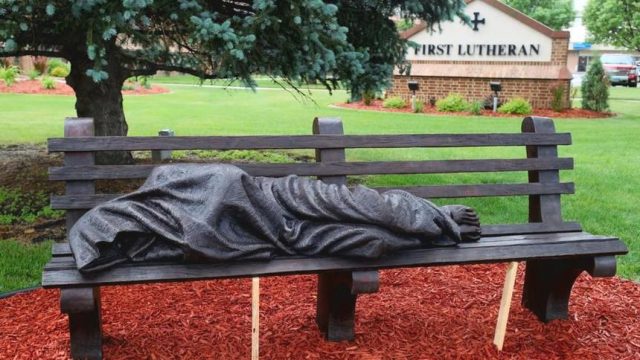‘Homeless Jesus’ Made Me Think of Our Lost Sense of Community, Which Was Probably the Point

“Emergency crews have responded at least twice since a ‘Homeless Jesus’ statue was set up about a month ago in front of First Lutheran Church in downtown Fargo,” Ethan Nelson reports.
The display, which shows a robed figure laying prone on a park bench, causes some people to call 911 fearing that it’s a real person in some sort of distress. This is apparently a not uncommon reaction in the communities where the statute has been displayed.
It’s an interesting one too.
You see, someone who has called 911 clearly hasn’t gone close enough to the figure to see that it’s just a statute. Which illustrates something sort of uncomfortable, doesn’t it? That when confronted with what we think is someone who looks to be in distress we call someone else to solve the problem for us.
Which isn’t a judgment on those who called 911. They were just trying to do the right thing. And I should point out that the calls to 911 do not represent the people who checked on the statute themselves only to walk off with a rueful chuckle. We don’t know how many times that happened.
But it is telling that some called about the figure but didn’t approach it.
[mks_pullquote align=”right” width=”300″ size=”24″ bg_color=”#ffffff” txt_color=”#000000″]But both incidents speak to an impulse many of us have to avoid personal, direct action when confronted with a problem in the form of another person.[/mks_pullquote]
That is perhaps a small commentary on this age of social isolation, with so many of our interactions with one another taking place through a glowing digital screen. In another era maybe more people would have checked on ‘Homeless Jesus’ first before calling 911. Or maybe that’s unfair. Those people didn’t have a communication device in their pocket, ready to call in the authorities to address perceived trouble.
Nelson’s story reminded me of Kirk Ludwig, a Fargo man who a year ago was pilloried on social media after someone posted on Facebook photos of him taking pictures near the city’s Island Park pool area. The implication of the Facebook post wast that Ludwig was being a creep, taking pictures of the women and/or children playing in the pool.
Ludwig, who is a photography enthusiast, says he wasn’t doing any such thing. Whether you believe him or not, the ugly truth of that situation is that for all the thousands and thousands of social media postings expressing outrage at Ludwig not one single person called the police. It was Ludwig himself who called the police first after becoming alarmed at the tidal wave of invective being directed toward him.
He was frightened of a social media lynch mob that was forming online, and who can blame him?
At first blush the Ludwig incident and ‘Homeless Jesus’ might not seem all that similar. After all, one has to do with nobody calling the authorities when they probably should have, and the other has to do with people calling the authorities when they shouldn’t have.
But both incidents speak to an impulse many of us have to avoid personal, direct action when confronted with a problem in the form of another person. With Ludwig thousands of people decided the proper reaction wasn’t to contact the authorities about a potentially dangerous person in a public park but rather to post outrage and insults on social media. With ‘Homeless Jesus’ people seeing what they think is someone in distress don’t get close enough to see that the person is really a statute but rather call someone else to handle the problem.
Another less provocative example are all those social media posts you read about someone getting horrible service at some restaurant or business. These people will complain about their under-cooked steak or long wait in line to the internet, but how many of them take the time to talk to the manager about it?
Not that many. A quick Facebook post is easier than, you know, actually interacting with someone in person.
We’re often quick to complain about problems. We’re much slower to get involved with solving those problems.
We’re losing some of our sense of community, I think, and I’m sorry to see it go.
‘Homeless Jesus’ made me think about that. Which was probably the point.
We could all probably do more to be aware of the problems around us in our communities, and work to address those problems in a more personal sort of way.




